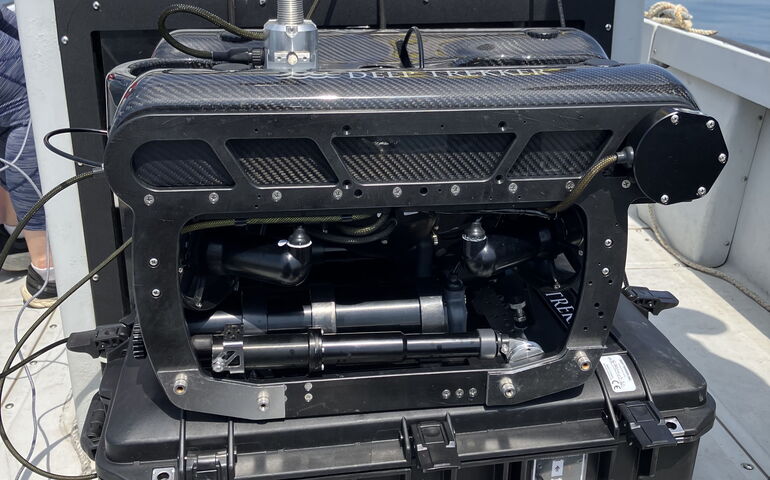Maine regulator acquires remotely operated vehicle to assess aquaculture sites
 Photo / Courtesy Department of Marine Resources
The Department of Marine Resources acquired a Deep Trekker Pivot remotely operated vehicle to evaluate proposed aquaculture sites.
Photo / Courtesy Department of Marine Resources
The Department of Marine Resources acquired a Deep Trekker Pivot remotely operated vehicle to evaluate proposed aquaculture sites.
Before 2023, the Department of Marine Resources would conduct site visits for proposed aquaculture leases by outfitting scientists with dive equipment and GoPro cameras — a relatively time consuming and labor-intensive process.
Two years ago, the department acquired a 14-year-old remotely operated underwater vehicle to streamline the process.
When the older model began to fail last winter, the department turned to the Maine Aquaculture Innovation Center for a $51,024 grant to buy a Deep Trekker Pivot remotely operated vehicle, which arrived in June.
The new technology includes "features that not only save time and resources but also provide the potential for improvements to information and data gathering on lease sites,” said Amanda Ellis, director of the department’s aquaculture division.
The department is required by law to conduct site visits for all proposed standard and experimental leases. As part of the site assessment, regulator must obtain or verify information related to the general characteristics of the area including flora and fauna, bottom composition and water depths.
In 2023, the department began to explore ways to improve efficiency of site visits.
“Efficiency is critical because of the increased interest in Maine’s aquaculture sector,” said Ellis. “The number of lease application submissions has increased significantly over the past several years. It can take up to three years, from the date a proposal was deemed complete, to issue a final decision on the application. These timeframes are very challenging for industry.”
The department’s lead aquaculture scientist, Meryl Grady, recognized that using a remotely operated vehicle could provide time savings without compromising the quality of site assessments, according to a news release. Use of the 2009 model remotely operated vehicle, previously used by the department’s science bureau, nearly tripled the number of site visits that could be completed in a year. In 2022, there were 20 assessments. In 2023 and 2024, with the ROV, there were 52 each year.
The new technology will save more than 600 hours of staff time.
“The data collected is easily integrated into written reports, reducing the overall time staff spend drafting and refining them, allowing them to focus on other critical tasks,” said Ellis.










0 Comments